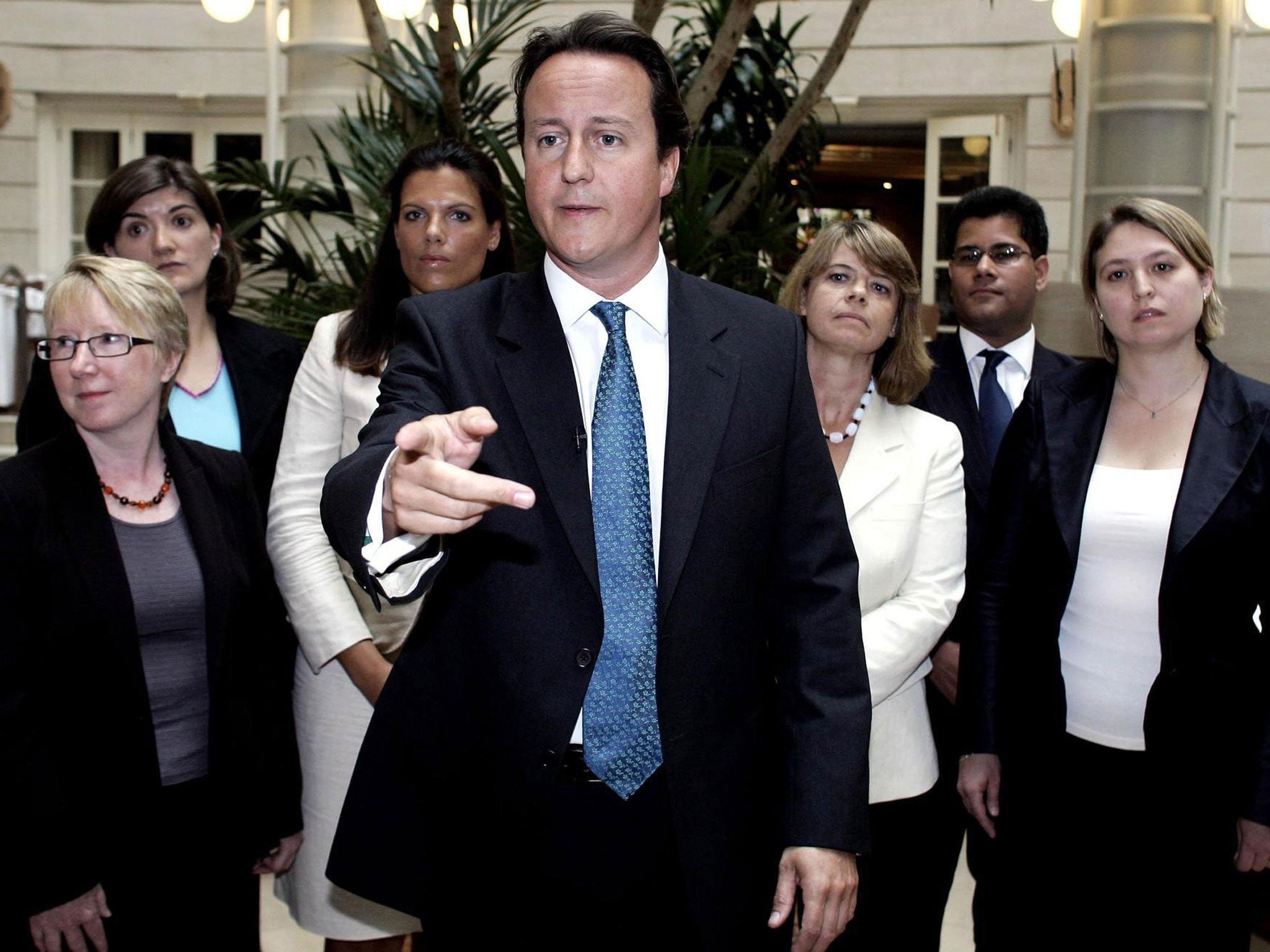David Cameron's dream of an 'A-list' of women candidates fades
Less than a third of those selected so far in Tory constituencies are women, as Prime Minister becomes frustrated with slow progress of modernising his party

David Cameron is facing a showdown with Conservative grass roots as he becomes frustrated by activists’ refusal to select more women to stand for Parliament in 2015, The Independent can disclose. The Prime Minister has privately expressed his irritation that local associations are failing to select more female candidates, jeopardising his hopes of boosting the number of women Conservative MPs.
Fewer than one in three of the candidates so far selected in Tory-held constituencies or crucial target seats are women. It leaves the Prime Minister facing the potential embarrassment of the number of female Tory MPs increasing only marginally at the next election – or even decreasing if the party’s parliamentary strength falls in 2015.
One senior minister told The Independent: “The Prime Minister is very exercised about this and is frustrated that more constituencies aren’t picking women candidates. But he knows there’s not much he can do – he has sent out plenty of messages about modernising the look of the party, but it is slow progress.”
The issue puts Mr Cameron at odds with many activists already angry over his backing for same-sex marriage and who are pressing him to adopt more Eurosceptic policies to combat the rise of the UK Independence Party.
With less than 18 months to go to the next election, 63 candidates have been chosen so far in Conservative-held or winnable seats, of whom just 19 are women, a proportion of 30 per cent. In 10 seats won by the party at the last election, eight men and two women have been selected for the Tories, a proportion which has infuriated Mr Cameron. Associations in a further 53 seats which the Tories have realistic hopes of capturing have chosen 36 men and 17 women.
The number of women Tory MPs rose sharply at the last election to 49, but that still represented only 16 per cent of the parliamentary party.
By contrast, 31 per cent of Labour MPs were female, and only 12 per cent of Liberal Democrats were women.
Two Tory new arrivals in 2010, Laura Sandys in South Thanet and Lorraine Fullbrook in South Ribble, have said they will stand down at the next election, citing personal reasons. A third woman elected for the first time three years ago, Louise Mensch, has already resigned as the MP for Corby and East Northants, triggering a by-election which the Conservatives lost. A male candidate has already been selected to represent the party at the next election. In addition to the three departures, some party sources are resigned to further female MPs from the 2010 intake deciding not to stand again.
Selections have been secured by men in a succession of Conservative-held seats where the sitting MP is preparing to retire. They include the entrepreneur Chris Philp, who was the only man on the four-strong shortlist in Croydon South, Robert Jenrick in Newark and Craig Williams in Cardiff North.
Four more men have been selected in Tory seats through open primaries – Nigel Huddleston (Mid Worcestershire), Ranil Jayawardena (North East Hampshire), Tom Tugendhat (Tonbridge and Malling), and David Mackintosh (Northampton South). Two women have bucked the trend this month, with Lucy Frazer being chosen in Cambridgeshire South East and Nusrat Ghani in Wealden.
Tory men have also been picked in a series of the highly marginal seats it is essential for the party to capture to win the next election outright. They include Simon Marcus in Hampstead and Kilburn and Chris Green in Bolton West, in each of which Labour is defending a majority of less than 100. Three men have already been selected in seats where the Liberal Democrats have tiny majorities over the Conservatives. They are Julian Knight in Solihull, Michael Tomlinson in Mid-Dorset and Poole and James Heappey in Wells.
The failure of women to break through in larger numbers led a prominent backbencher to urge her party to consider adopting all-women shortlists after the next election – an approach currently anathema to the Tories.
Sarah Wollaston, the MP for Totnes, said the proportion of female candidates chosen so far was disappointing, particularly given the strong lead of Mr Cameron and prominent women MPs. But she advocated a dramatic change of tack if the party failed to achieve 40 per cent female representation in the Commons in the next parliament. “If we can’t sort it out by 2015, we should shift to all-women shortlists,” she said.
The Tories have made progress on the issue following Mr Cameron’s election as party leader, when there were only 17 female Tory MPs. He championed the concept of an “A-list” of his preferred candidates, many of whom were high-flying women, but since the last election it has been virtually abandoned.
Join our commenting forum
Join thought-provoking conversations, follow other Independent readers and see their replies
Comments
Bookmark popover
Removed from bookmarks